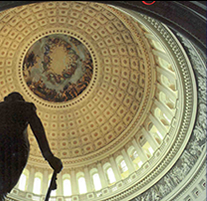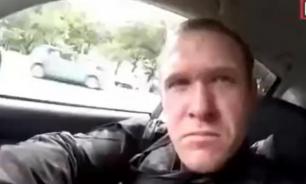Top congressional Republican testifies before panel investigating sex scandal
The top Republican in Congress sat down Tuesday with a panel investigating when he and his staff learned that another Republican congressman had sent illicit messages to male teenage assistants and what they did to stop it.

The scandal over Congressman Mark Foley's sexually explicit messages to the assistants, called pages, has hurt Republican prospects of retaining control of Congress in the Nov. 7 elections.
The House leader, speaker Dennis Hastert, spoke briefly about his closed door testimony to the ethics committee that is trying to pin down when he and his staff learned about Foley's actions.
"I answered all the questions they asked to the best of my ability," Hastert said after testifying for three hours."I also said that they need to move quickly to get to the bottom of this issue, including who knew about the sexually explicit messages and when they know about it."
Hastert and his staff have provided a timeline of events that conflicts with the accounts of others. Hastert has said that he did not find out about Foley until late September, when Foley resigned after his approaches to former pages became public.
Hastert's appearance followed that of Congressman Tom Reynolds, the House Republican election campaign chairman, who said he warned Hastert about Foley last spring.
Hastert has said he did not recall that conversation. He also has been unable to recall speaking with Majority Leader John Boehner, the No. 2 Republican in the House, about Foley last spring, although Boehner says Hastert even told him the matter was being handled.
There is a separate conflict over whether Hastert's top aides learned about Foley a year ago, as the speaker says, or whether the speaker's chief of staff was told as much as three years ago as asserted by Foley's one-time chief of staff.
Hastert has vowed to fire any of his aides if they covered up knowledge of Foley's behavior.
Shortly before Hastert appeared, his security detail arrived and went inside the ethics committee room, where testimony is taken in secret sessions.
Hastert then arrived with his attorney, J. Randolph Evans of Atlanta.
After Reynolds' closed-door testimony, he urged a "full and fair investigation of the facts" and said that "I strongly encourage any of my colleagues who have information that may be of relevance to bring it to the committee's attention at once."
Previously, Reynolds has said he does not remember what month he told Hastert about the worrisome computer messages that Foley sent to former male pages only that it happened sometime in the spring. Reynolds also has said he did not recall the details of the conversation.
A four-member subcommittee of the House ethics committee is keeping key witnesses behind closed doors for hours as it tries to unravel the conflicts in the handling of the Foley matter.
Hastert's chief of staff, Scott Palmer, spent more than six hours before the committee Monday. Palmer has disputed one account that he was warned about Foley in 2002 or 2003.
Former Foley chief of staff Kirk Fordham has said he warned Palmer about Foley in 2002 or 2003.
"What Kirk Fordham said did not happen," Palmer said weeks ago in his lone public statement on the matter, reports AP.
Hastert has a lot riding on the outcome of the ethics investigation. He has fended off calls for his resignation with statements that his staff members acted properly after they learned a year ago about Foley's friendly but not sexually explicit messages to the former Louisiana page.
Subscribe to Pravda.Ru Telegram channel, Facebook, RSS!





